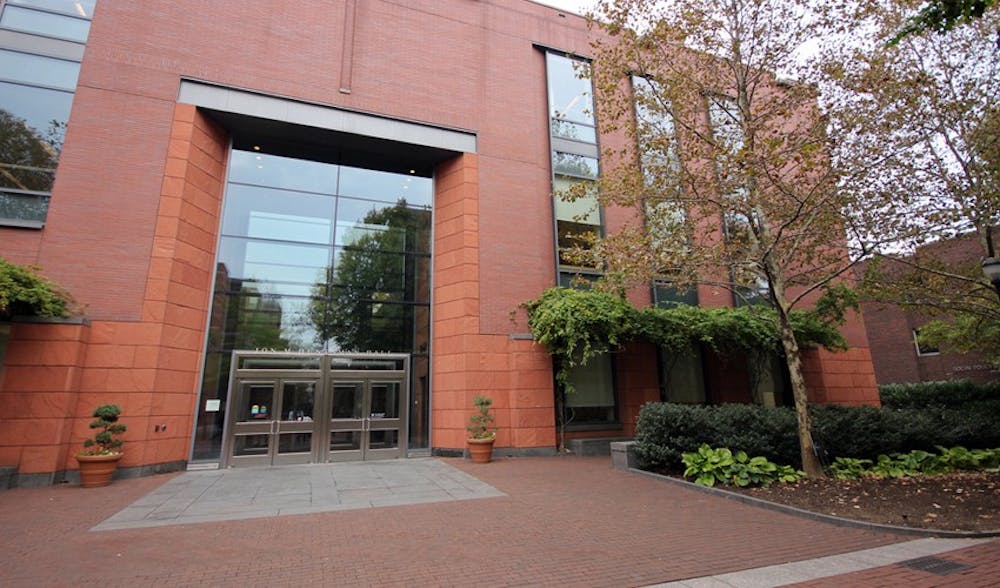
Not all Wharton undergraduate alumni come back to campus just for homecoming weekend. Some return for two more years to earn three more letters: MBA.
2009 Wharton graduate and now first-year MBA student Amanda Pagoulatos decided to pursue an MBA after she made the decision to switch fields from sports entertainment to brand management. After working with companies like Pepsi and Foot Locker and helping them create sports marketing strategies, Pagoulatos realized that her passion was for “working on the brand side and not being a consultant,” she said.
“Most brand managers that work for companies like Unilever, Colgate, Mars Chocolate — a lot of them have their MBAs. You need that to launch into [the industry],” she said. Pagoulatos chose Wharton because she “absolutely loved it in undergrad,” adding that her husband is also a first-year Wharton MBA student.
Others choose to pursue MBAs to gain more credibility within their current fields.
Jennifer Meth, who received a Wharton MBA in 1998, worked in taxes at KPMG when the company sponsored her to get her MBA. Meth said the experience made her “a better business person.”
“I could normally just be looked at as an accounting and tax person, but [the MBA] helps me sit at the table with the traders and the people at the front office and execution side,” Meth, also a 1990 Wharton graduate, said. “I think having the MBA gives me a lot of credibility.”
Meth shares the mindset of some others, who return to Wharton for their MBA, even if they thought a Bachelor of Science in Economics would have been sufficient.
“Plenty of people who were in Wharton undergrad felt that they would not need advanced degrees,” Meth said. “I never expected to get an MBA.”
Meth added that she had been accepted to Penn Law School directly after undergrad, but deferred and later declined the offer.
Wharton freshman Fabian Hutter confirmed that the viewpoint of Wharton undergraduate students has remained much the same.
“I think many people think that way and to a certain extent it is definitely true,” he said referring to Wharton undergraduate alumni returning for their MBAs.
But Hutter added that he is considering an MBA. “I will want to reorient myself in 10 to 20 years,” he said. “A lot of things will change in the business world. I want to get an update.”
2006 Wharton graduate and now first-year MBA student Brian Vo looks at his decision to get an MBA more philosophically. Vo said that his main motivation for returning to Wharton, after working in investment banking, private equity and management consulting, was to reflect on how he wants to move forward professionally.
“It was a natural pause in my career. I had worked so fast, so hard for eight years,” Vo said. “I’m using the two year gap to fill in the blanks.”
For Vo, the difference between Wharton undergraduate and MBA is “like night and day.” Vo said in the undergraduate program he struggled to “find [his] niche,” adding that there was a “loud minority” who “thought they were better than everyone else.”
“There is much more of a social camaraderie with the MBAs,” he said. “Everyone acknowledges that we have something to bring.”
Pagoulatos also noted strong differences between the undergraduate and MBA programs.
“Undergrad is more about understanding the concepts. [The MBA] is more real world learning, having understood how these concepts apply in the workplace,” Pagoulatos said.
Fellow first-year MBA and 2007 Wharton graduate Jeremy Semble echoed Pagoulatos’ sentiments.
“At the MBA level, you have a lot of life experience and a better sense of who you are and what your goals are,” Semble said. “The stuff you learn in Wharton undergrad is definitely enough in terms of the technical skills. The decision to get MBA is more about personal growth.”
Vo said that, so far, one of the most important lessons the MBA has taught him is that he does not have to know the right answer to everything. “I know enough to ask the right questions and bring in the right people to solve the problem with or for me,” he said.
Related: Wharton MBA program posts top employment statistics
The Daily Pennsylvanian is an independent, student-run newspaper. Please consider making a donation to support the coverage that shapes the University. Your generosity ensures a future of strong journalism at Penn.
DonatePlease note All comments are eligible for publication in The Daily Pennsylvanian.




